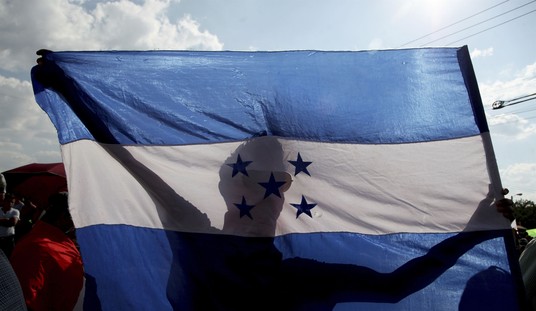According to the Jerusalem Post, earlier this month Iranian Foreign Minister Manouchehr Mottaki challenged Western countries to admit whether or not they had helped Israeli “terror brigades” assassinate Mahmud al-Mabhouh — a senior Hamas operative who played a major part in smuggling advanced rockets from Iran to Palestinian terrorists in Gaza. Mottaki said their silence was “undermining calls to fight terrorism.”
For the Islamic Republic of Iran to vociferously challenge Western nations and Israel on the subject of terrorism takes a special brand of chutzpah.
The Islamic Republic of Iran (IRI) has been implicated in worldwide terrorism since its establishment in 1979. Among its countless terrorist actions, the IRI orchestrated the 1983 bombings of the U.S. embassy in Beirut (60 killed) and the U.S. Marine barracks (241 killed) in Beirut. In 1994 the IRI engineered the bombing of a Jewish community center in Buenos Aires (85 killed), and two years later the bombing of the Khobar Towers in Saudi Arabia (19 killed). CNN reported on February 11, 2007, that Iranian forces killed at least 170 U.S. troops in Iraq.
This self-righteous Iranian response to the death of a Palestinian Hamas terrorist and their “concern about undermining calls to fight terrorism” is laughable. The mullahs of Tehran have exploited the Palestinians as part of their strategic plan of mobilizing Sunni Arabs to undermine Israel and pro-Western Sunni Arab regimes through a worldwide terror campaign. And while the Iranians are cultivating Hamas and providing this terrorist organization with arms, funds, and training, they are waging a deliberate campaign of ethnic cleansing, murder, and assassination of Sunni Arab Muslims and other fellow Sunni Muslims, including Baluchis and Kurds.
The Islamic Republic of Iran has a 31-year history of murder and assassination of political opponents and dissidents. According to the Iran Human Rights Documentation Center:
Since 1979, the senior leadership of the Islamic Republic of Iran has been linked to at least 162 extrajudicial killings of the regime’s political opponents in 19 different countries around the world. These operations flourished in contravention of both international and national legal regimes, and were planned at the highest levels of state. Many of those responsible are still in power today.
The murder and rape of Persian demonstrators notwithstanding, the Tehran theocratic regime is particularly murderous when it comes to Sunni-Muslim ethnic minorities, especially Kurds, Baluchis, and Ahwazi Arab activists.
On July 14, 2009, the Islamic Republic of Iran (IRI) hanged 13 young Baluch student activists. The Sunni-Muslim Baluch people have been in the vanguard of the political campaign against the Shiite dominated Islamic Republic of Iran. The young Baluch students were tortured in order to exact confessions that they acted on behalf of the CIA — and then they were hanged. The Sunni Muslims of Baluchistan are deemed a political and religious threat to the IRI. They are a persecuted ethnic and religious minority. Many of the Baluch victims were alleged members of the PRMI (People’s Resistance Movement of Iran), also known as Jondallah — an armed Baluch opposition group campaigning against what they see as Persian and Shia Muslim oppression of their Baluch Sunni Muslim nation.
Currently there are 18 young Iranian Kurds on death row, two of whom are women.
The Kurdish Herald reported:
On January 6, 2010, 28-year-old Fasih Yasamani, a Kurdish activist, was executed in the city of Saqqez. Yasamani was convicted in a show trial of being a member of the Party for a Free Life in Kurdistan (PJAK).
Earlier, on November 11, 2009, the IRI executed Ehsan Fatahiyan, and according to his lawyer, Fatahiyan was subjected to consistently brutal torture during his incarceration in order to force him to confess. He refused and was subsequently executed.
The 18 young Kurds awaiting execution include Zeinab Jalaliyan, 27, who was arrested in the city of Kermanshah and sentenced to die in a show trial for being a member of a Kurdish political party. Shirin Alamholy, also 27, was sentenced to death for being an “enemy of God” for allegedly being a member of a Kurdish political party. Habibollah Latifi, a student activist, was also convicted of being a “mohareb” or an “enemy of God,” and for allegedly being a member of the PJAK. Latifi was moved to solitary confinement on January 16, 2010, as a prelude to his imminent execution. Shirko Moarefi, 30, was arrested on October 31, 2008, in the city of Saqqez, and after months of interrogation and torture and a subsequent show trial was sentenced to death for being an “enemy of God” or a “mohareb.” The fate of the rest of the 18 young Kurds sentenced to die is unknown.
The Iranian southwestern province of Khuzestan used to be an autonomous province populated by indigenous Sunni Arabs. In 1925 Iran forcibly annexed the province and has since then exercised “ethnic cleansing” by removing the Arabs from this oil-rich area and populating it with Persian Shiites. Sunni Arabs or Ahwazis have been in a state of rebellion against this oppressive Shiite Islamic Republic of Iran. Amnesty International has reported that seven members of Iran’s Ahwazi Arab minority are facing imminent execution in Ahwaz city, the capital of Khuzestan province.
The seven men were convicted in a sham show trial of “acting against national security” and the alleged killing of Shiite cleric Sheikh Hesham al-Sameyri in June 2007. The seven, Ali Saedi, Walid Naisi, Majjid Mahawi, Doayr Mahawi and his son Maher, Ahmad Saedi, and Yusuf Leftehpour, were arrested in August 2007 and held incommunicado by the Iranian intelligence services for 15 months in an unknown location. They were subsequently transferred to Karoun prison in Ahwaz city where they were tortured and sentenced to death by the Iranian Revolutionary Court in September 2009, in an unfair trial and with no access to a lawyer.
The Islamic Republic of Iran’s call for Islamic solidarity in fighting the “enemies of Islam” rings specious when it is waging a deadly and intolerant campaign against non-Persian Sunni Muslims. The time has come for Arab-Palestinians and other Sunni Arabs to recognize the clear hypocrisy.









Join the conversation as a VIP Member